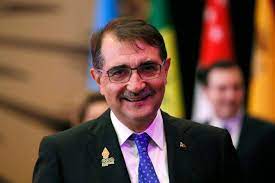Sinem Cengiz
The natural gas purchase agreement signed in the last week by Oman and Turkiye is the latest in a series of small steps showing both Ankara and Muscat’s interest in improving bilateral relations. The deal was the result of mutual efforts to expand energy cooperation between the two countries.
On Monday, Oman LNG signed a long-term agreement with Turkish state energy company the BOTAS Petroleum Pipeline Corporation to supply 1.4 billion cubic meters of liquefied natural gas annually under a 10-year contract starting in 2025. Turkish Minister of Energy and Natural Resources Fatih Donmez said that, although the agreement is valid for 10 years, it could be extended if the conditions are favorable. Several other international energy firms have recently signed long-term agreements with Oman LNG to import LNG from the sultanate. Turkiye’s natural gas deal was the outcome of a visit to Oman by Donmez last August. His visit and meetings there focused on investment opportunities in oil, gas, renewable energy and hydrogen. After the visit, a delegation from BOTAS went to Oman for talks. Turkiye is to host a gas summit on Feb. 14-15, with the motto “Securing the Future Together.”
Turkiye and Oman share a complementarity of means and goals in the region and beyond, and the recent natural gas purchase agreement is an important step in a trust and relations-developing process aimed at deepening ties. It fits within Oman’s foreign policy focus on economic diplomacy, while it is also in line with Turkiye’s increasing interest in enhancing trade relations with individual Gulf countries. Moreover, like the other Gulf countries, Oman is envisioning an economic development initiative, which is known as Oman Vision 2040. Turkiye could benefit from taking a more active role in this regard.
The Turkiye-Gulf reconciliation has created room for Oman to foster its relations with Ankara without the pressure of the tensions seen over the past decade. Oman, which is known as the “Switzerland of Arabia” due to its legacy of diplomacy, pursues a neutral and inclusive approach toward Turkiye. This approach is solely motivated by pragmatism and aims to fortify its position in an increasingly volatile region. As part of this policy, it has improved its economic and defense relations with Ankara. But these relations are still at a moderate level.
However, significant developments have taken place in the past two years. In January 2021, the Omani-Turkish Friendship Association was established by the Omani Foreign Ministry to symbolize the two countries’ continued cooperation. In November, Turkiye and Oman signed a cooperation protocol to increase mutual trade and cooperation in various fields. In January, Oman ratified a protocol amending its air services agreement with Turkiye that was signed in Montreal last year.
Energy is not the only dimension of Turkish-Omani relations. In 2001, the two countries signed a memorandum of understanding to promote military cooperation. It is hard to make bold statements about a cooperation deal between two countries on military-defense issues. However, the military relations between Oman and Turkiye are reportedly said to be anchored on the strong foothold that Turkish defense companies Havelsan and FNSS have gained in the sultanate.
Also, there were reports in 2021 that the Omani and Turkish defense ministries had reached a preliminary understanding on Muscat’s procurement of Bayraktar TB2 drones, but no details were disclosed. Kuwait, the UAE and Qatar are among the GCC countries to have already signed agreements with Turkiye to buy TB2s.
Meanwhile, among the Gulf countries, Oman and Saudi Arabia are yet to join NATO’s Istanbul Cooperation Initiative, which was launched in 2004 in Turkiye. The UAE, Kuwait, Bahrain and Qatar are already members. Crucially, Turkiye, which is a member of NATO and has the second-largest army in the bloc after the US, actively helped to strengthen the partnership between NATO and the GCC. Oman maintains a neutral line on military issues, but there are reports that it has also expressed an interest in cooperating with NATO. Developing cooperation with Turkiye on military and defense issues could be an important step in this direction. Additionally, Oman is a country that has cautiously balanced its relations with diverse actors in the region, such as Iran, Israel and even Syria. Turkiye could comfortably boost relations with Oman without having the concern of a divergence of views on foreign policy issues.
To cement further progress, Turkish-Omani relations should move beyond the political and energy/economic dimensions and also include social and cultural aspects. There is a limited amount of literature related to Omani-Turkish relations. For this reason, there is a lack of knowledge in both Turkiye and Oman about their interests and capabilities in enhancing bilateral relations.
Arab News







